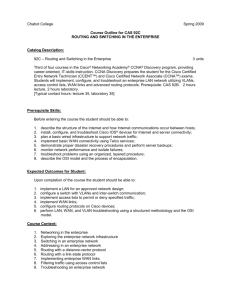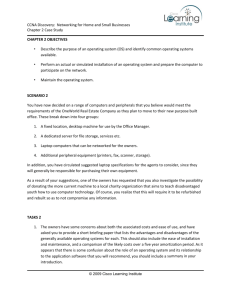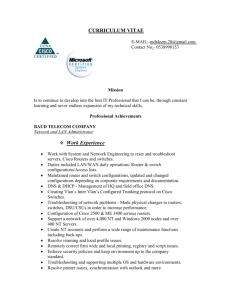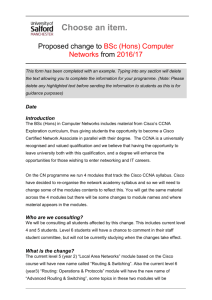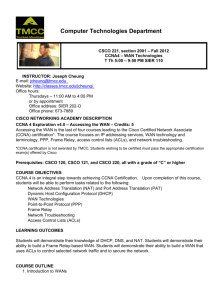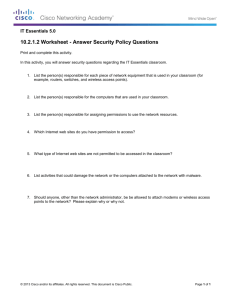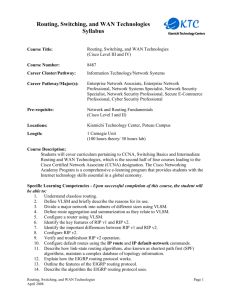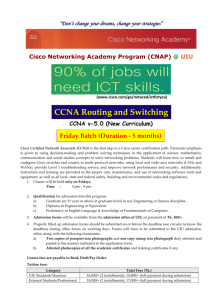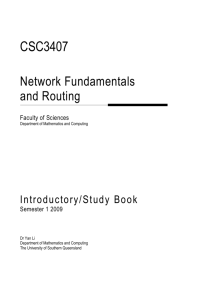USQ study material - University of Southern Queensland
advertisement
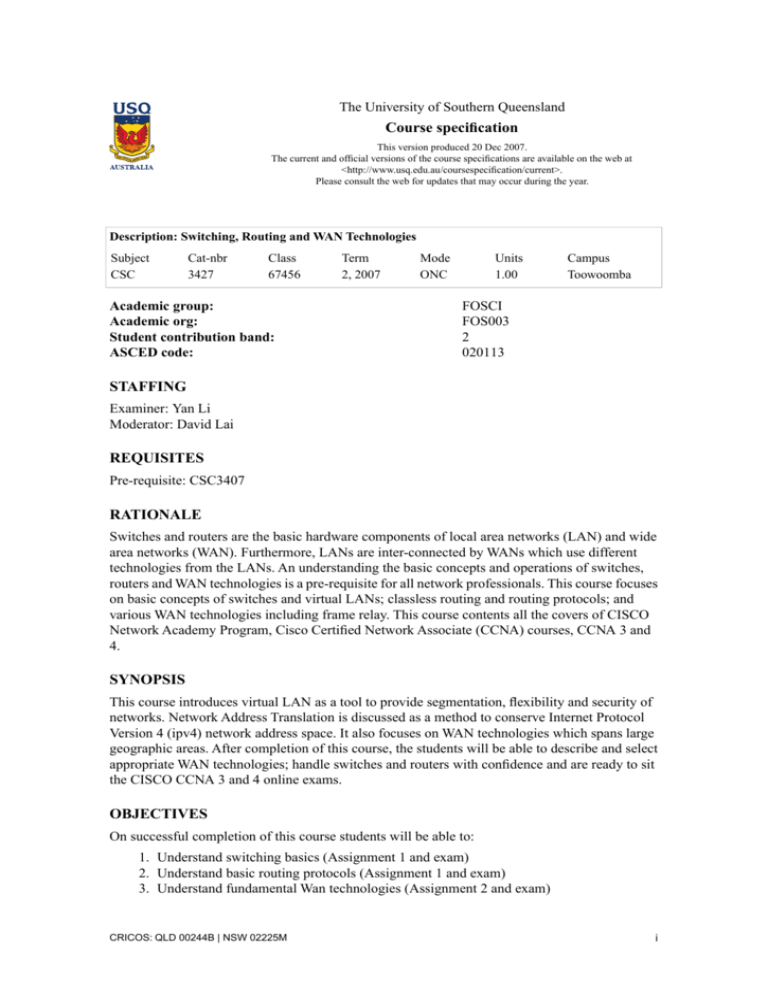
The University of Southern Queensland Course specification This version produced 20 Dec 2007. The current and official versions of the course specifications are available on the web at <http://www.usq.edu.au/coursespecification/current>. Please consult the web for updates that may occur during the year. Description: Switching, Routing and WAN Technologies Subject CSC Cat-nbr 3427 Class 67456 Academic group: Academic org: Student contribution band: ASCED code: Term 2, 2007 Mode ONC Units 1.00 Campus Toowoomba FOSCI FOS003 2 020113 STAFFING Examiner: Yan Li Moderator: David Lai REQUISITES Pre-requisite: CSC3407 RATIONALE Switches and routers are the basic hardware components of local area networks (LAN) and wide area networks (WAN). Furthermore, LANs are inter-connected by WANs which use different technologies from the LANs. An understanding the basic concepts and operations of switches, routers and WAN technologies is a pre-requisite for all network professionals. This course focuses on basic concepts of switches and virtual LANs; classless routing and routing protocols; and various WAN technologies including frame relay. This course contents all the covers of CISCO Network Academy Program, Cisco Certified Network Associate (CCNA) courses, CCNA 3 and 4. SYNOPSIS This course introduces virtual LAN as a tool to provide segmentation, flexibility and security of networks. Network Address Translation is discussed as a method to conserve Internet Protocol Version 4 (ipv4) network address space. It also focuses on WAN technologies which spans large geographic areas. After completion of this course, the students will be able to describe and select appropriate WAN technologies; handle switches and routers with confidence and are ready to sit the CISCO CCNA 3 and 4 online exams. OBJECTIVES On successful completion of this course students will be able to: 1. Understand switching basics (Assignment 1 and exam) 2. Understand basic routing protocols (Assignment 1 and exam) 3. Understand fundamental Wan technologies (Assignment 2 and exam) CRICOS: QLD 00244B | NSW 02225M i 4. 5. 6. 7. 8. Design, implement and maintain virtual LANs using switches (Assignment 1 and exam) Select different routing protocols. (Assignment 1 and exam) Configure routers to use different routing protocols. (Assignment 1 and exam) Describe and select WAN technologies. (Assignment 2 and exam) Configure routers to use different WAN technologies. (Assignment 2 and exam) TOPICS Description Weighting (%) 1. Classless Routing 10.00 2. Single area Open Shortest Path First (OSPF) routing protocol 10.00 3. Enhanced Interior Gateway Routing Protocol (EIGRP) 10.00 4. Local Area Network (LAN) design and switches 10.00 5. Virtual LAN (VLAN) and VLAN Trunking Protocol 10.00 6. Network Address Translation and Port Address Translation 10.00 7. Dynamic Host Configuration Protocol 10.00 8. Wan technologies and Point to Point Protocol 10.00 9. Integrated Service Digital Network and Dial on Demand Routing 10.00 10. Frame relay 10.00 TEXT and MATERIALS required to be PURCHASED or ACCESSED ALL textbooks and materials are available for purchase from USQ BOOKSHOP (unless otherwise stated). Orders may be placed via secure internet, free fax 1800642453, phone 07 46312742 (within Australia), or mail. Overseas students should fax +61 7 46311743, or phone +61 7 46312742. For costs, further details, and internet ordering, use the 'Textbook Search' facility at http://bookshop.usq.edu.au click 'Semester', then enter your 'Course Code' (no spaces). 2007, CSC3427 Switching, routing and WAN technologies, introduction/study book, University of Southern Queensland, Toowoomba, Australia. (This material will be provided on the course website: http://www.sci.usq.edu.au/courses/csc3427) Lewis, Wayne 2006, Switching basics and intermediate routing, CCNA 3 companion guide (cisco networking academy program), 1st edn, Cisco Press, (ISBN:1-58713-170-6) Reid, Allen 2006, Wan technologies, CCNA 4 companion guide (cisco networking academy program), 1st edn, Cisco Press, (ISBN:1-58713-172-2) (A shrink-wrapped value pack version of the two Companion Guide books may be available.) CRICOS: QLD 00244B | NSW 02225M ii REFERENCE MATERIALS Reference materials are materials that, if accessed by students, may improve their knowledge and understanding of the material in the course and enrich their learning experience. Empson, Scott D 2005, CCNA command quick reference (cisco networking academy program), Cisco Press, (1-58713-159-5) Johnson, Allan 2006, Switching basics and intermediate routing, CCNA 3 (cisco networking academy program) labs and study guide, 2nd edn, Cisco Press, (ISBN:1-58713-171-4) Rullan, John 2006, WAN technologies CCNA 4 (cisco networking academy program) labs and study guide, 1st edn, Cisco Press, (ISBN:1-58713-173-0) STUDENT WORKLOAD REQUIREMENTS ACTIVITY HOURS Directed Study 65.00 Examinations 2.00 Private Study 85.00 ASSESSMENT DETAILS Description Marks out of Wtg(%) Due date ASSIGNMENT 1 100.00 20.00 31 Aug 2007 ASSIGNMENT 2 100.00 20.00 19 Oct 2007 2 HOUR CLOSED EXAMINATION 100.00 60.00 END S2 (see note 1) NOTES 1. Examination dates will be available during the semester. Please refer to the examination timetable when published. IMPORTANT ASSESSMENT INFORMATION 1 Attendance requirements: It is the students' responsibility to attend and participate appropriately in all activities (such as lectures, tutorials, laboratories and practical work) scheduled for them, and to study all material provided to them or required to be accessed by them to maximise their chance of meeting the objectives of the course and to be informed of course-related activities and administration. 2 Requirements for students to complete each assessment item satisfactorily: To complete each of the assessment items satisfactorily, students must obtain at least 50% of the marks available. 3 Penalties for late submission of required work: CRICOS: QLD 00244B | NSW 02225M iii 4 5 6 7 8 If students submit assignments after the due date without prior approval then a penalty of 5% of the total marks gained by the student for the assignment will apply for each working day late. Requirements for student to be awarded a passing grade in the course: To be assured of receiving a passing grade a student must achieve at least 50% of the total weighted marks available for the course. Method used to combine assessment results to attain final grade: The final grades for students will be assigned on the basis of the aggregate of the weighted marks obtained for each of the summative assessment items in the course. Examination information: Students are allowed to bring only writing and drawing instruments into the closed examination. Examination period when Deferred/Supplementary examinations will be held: Any Deferred or Supplementary examinations for this course will be held during the examination period at the end of the semester of the next offering of this course. University Regulations: Students should read USQ Regulations 5.1 Definitions, 5.6. Assessment, and 5.10 Academic Misconduct for further information and to avoid actions which might contravene University Regulations. These regulations can be found at the URL http://www.usq.edu.au/corporateservices/calendar/part5.htm or in the current USQ Handbook. ASSESSMENT NOTES 9 The due date for an assignment is the date by which a student must dispatch the assignment to the USQ. The onus is on the student to provide proof of the dispatch date, if requested by the Examiner. 10 In accordance with University policy, the Examiner may grant an extension of the due date of an assignment in extenuating circumstances 11 The Faculty will NOT accept submission of assignments by facsimile. 12 In the event that a due date for an assignment falls on a local public holiday in their areas, such as a Show holiday, the due date for the assignment will be the next working day. Students are to note on the assignment cover the date of the public holiday for the Examiner's convenience. 13 Students who have undertaken all of the required assessments in a course but who have failed to meet some of the specified objectives of a course within the normally prescribed time may be awarded the temporary grade: IM (Incomplete - Make up). An IM grade will only be awarded when, in the opinion of the examiner, a student will be able to achieve the remaining objectives of the course after a period of non directed personal study. 14 Students must retain a copy of each item of all submitted assignments. Students may be required to provide a copy of an assignment submitted for assessment purposes. Such copies should be dispatched to the USQ within 24 hours of receipt of a request to do so. OTHER REQUIREMENTS 1 2 Students will require to access the Internet and an e-mail system. Students must check the course website on a weekly basis during the teaching semester. CRICOS: QLD 00244B | NSW 02225M iv
